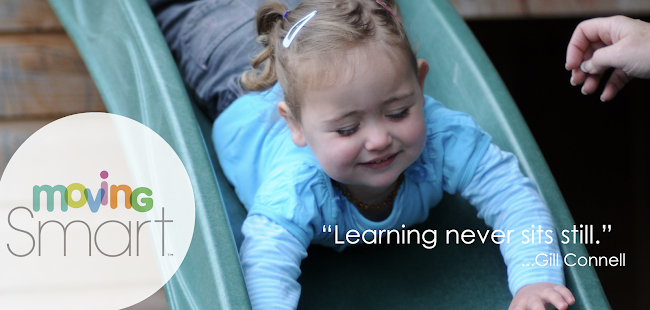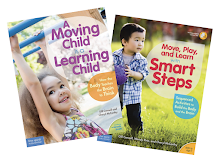Not long ago, I was talking to a mom of a three year old little girl. She
was clearly a loving mom and very in tune with her daughter who was bright, curious,
fun-loving, happy, and healthy. In other words, all's well.
But this mom was concerned that her daughter "wasn't interested in
anything educational in nature." She explained that she's tried lots of
different ways to interest her child in letters and numbers, but her daughter
"just isn't having any of it." So she wanted to know if I had any tried and true ways of introducing the ABCs and 123s to little ones.
I think this concern is very concerning.
What Is Educational?
In our current
culture, it seems we've all embraced the notion that anything related to
academics is "educational" and everything else is somehow not. I call this
"academic creep" -- a teach-to-the-test mentality that's clouding our
view of learning and short-changing our children by denying one
simple, intuitive truth...
For kids, EVERYTHING IS EDUCATIONAL.
 Forgive my soap-boxedness about this, but honestly, how could we have
come so far in advancing human knowledge only to have narrowed the definition
of "educational" to academic subject matter?
Forgive my soap-boxedness about this, but honestly, how could we have
come so far in advancing human knowledge only to have narrowed the definition
of "educational" to academic subject matter?
I'll never forget the first time my daughter Becky waved bye-bye on her
own. I was so proud, I told everyone how smart she was. And she was! She heard "bye bye" and
knew what to do. That's what I call learning.
Education vs. Academics
And what we call things actually does matter because words shape our
attitudes and actions. Certainly, learning letters and numbers is educational.
But so is learning to wave "bye bye," and how to put on your socks,
when to say please, what it takes to get to the top of the monkeybars, and how
not to get caught with your hand in the cookie jar.
A child who understands everyday language is ready for school.
A child who dresses herself is ready for school.
A child with good manners is ready for school.
A child with stamina, coordination, and persistence is ready for school.
A child who understands there are rules she is expected to follow and
consequences when she doesn't is ready for school.
It's all educational. It's just not academic.
And we must learn to separate the two in the way we think and speak about
learning.
What is Kindergarten Readiness, Really?
Now, you might be asking yourself, what about all those stories of kids not
being ready for kindergarten? As an educator and professional development
consultant, I agree many kids are NOT as ready as they need
to be today. As I see it, there are two academic trends colliding here: 1. we're
expecting more from kids earlier, and 2. we're starting them earlier.
I realize this sounds like double-talk, but it's the adult logic that's backwards here, in my view. It makes sense to us that if a child needs more preparation for the higher standards we set, we should start them earlier. After all, practice works, doesn't it? But learning at these early ages is a function of
developmental and neurological maturity. The brain simply isn't wired up
enough to process information the way it needs to be processed for schoolwork. And sitting little ones around a table doing worksheets is the exact OPPOSITE of what
they need to be "ready" for learning at that higher level.
Early childhood
learning is a personal, follow-your-nose journey of play and exploration with
no other agenda than what's fun and fascinating right now. That's nature's educational plan. In fact, a three
year old's brain is far more receptive to learning from mudpies and monkeybars
than ABCs and 123s right now.
Of course, gently introducing them to new things they haven't found on
their own is a great way to expand their learning horizons. But expecting them
to engage or "perform" academically or in any other arena, is another matter
entirely. They'll do their best to oblige us, of course, but if they can't, all
we're doing is setting the table for unnecessary stress and frustration.
Attitudes Towards Education
Just because a preschooler isn't showing interest in letters and numbers yet
does not mean she's not interested in "anything educational in
nature." That's an adult concept of what education is supposed to look like being applied to three-year-old behavior set against
the backdrop of "academic creep."
So when that mom applied the "educational" label to letters and
numbers, without realizing it, she was actually ignoring the educational value
in everything else her child WAS
interested in doing.
But what worries me most is the possibility of a false or fear-laden judgment
forming about the child's attitude towards academics, while overlooking her
individual disposition for learning. After all, how’s a three year old supposed
to know the difference between what's “educational” and “not educational?” And
even if she could, would she really be savvy enough to strike an attitude about
it, good or bad?
We need to
respect and celebrate learning in all its forms at all stages of early development. And yes,
sometimes that may be academic in nature. But if it's not right now, that's perfectly OK. It will happen when she's ready.
In the meantime, mudpies and monkeybars still have plenty to teach.
















I LOVE this post! I teach preschool and really, really want the parents of my students that learning is NOT just about ABCs and 123s! I will be sharing this with them. Thanks so much!
ReplyDeleteWhat a brilliant post! I wish every new parent could read it. I'm a teacher and so many people said to me, "your kids have an advantage because you can teach them to read and write before they start school"- aaaargh! WHY would a 4 year old need to read and write?? I hope I've taught them the skills and attitudes you describe, but mostly through giving them the freedom to play and enjoy learning about themselves and their surroundings in a fun and unstructured way.
ReplyDeleteGreat blog & points again, Gill! :-)
ReplyDeleteI just love this post and adore your attitude and perspective on the twisted world view of education, especially in the younger years.
ReplyDeleteI am an unschooling mother of two bright children and I have respected that every experience is a learning experience no matter what. I have learned to look at everything that my children and I do that way and I am honestly just amazed at all the learning we do on a daily basis.
I know many of you may not know what unschooling is, there is not a definitive term for it. Basically, in our family it is what I explained above. We do not bring school (formally) to the home. Yes, we do still fall into the very broad homeschooling category. Yes, my kiddos do have some work books and a ton of books and experiences. We tailor our kiddo's education and learning experiences around their interests.
Most kids actually know what they want to be in life around age 7 or so, IF they have been allowed to explore this great world and environment around them to their content and the you as the parent are there to guide and protect them. :)
Some resources if you are interested,
Learning All The Time - John Holt (any of his books actually)
Weapons of Mass Instructions -John Taylor Gatto (any of his books as well. He was Teacher of The Year a couple time in NYC public schools that he taught at for 30 years.)
There is so much more, I just can't pull the all from the "top of my head" at this moment ( my kiddos are asking for lunch).
I have a list on my blog. www.marco4bella.blogspot.com
Also, July 24th is Learn Nothing Day created by Sandra Dodd (it is actually a challenge to try not to learn anything that day and to your amazement, you will find it impossible to do. That is the point of the day).
Once again fabulous post! I am off to lunch with my kiddos!!! :)
Oops, I meant to say there is not a definitive definition of unschooling.
ReplyDeleteGill,
ReplyDeleteWhile I find every one of your posts valuable and something I want to share with the world.... this one is now one of my absolute favorites!!
This is a message I SO strongly voice in the Brain Insights materials, articles and speaking engagements throughout the country. You have so beautifully expressed something that is extremely critical to be fully understood!!
I am actually currently working on a post on the same topic. I will certainly link your post. This is one that I will be sharing everywhere immediately!!
Thanks as always for ALL you are doing to promote the healthy and happy development of children. The children will be quite grateful!!
Wonderful distinction for teachers and parents alike. Thanks!
ReplyDeleteExcellent post! I had a fellow teacher show some concern about her daughter. She is 2 and she was wanting her to be an early reader. she asked what I did to make my daughter and early reader. My answer...she wasn't! I told her she had all the skills she needed but wasn't interested. She loved to write instead. I told her to read with her daughter, talk with her daughter, give her lots of experiences and she wouldn't have anything to worry about.
ReplyDeleteKelly
I'm Not Your Grandpa, I'm Your Teacher
I love this post too. It does address a very deep concern of mine about parenting and education, and how to prepare our children for school - or perhaps how NOT to prepare them. And yes, it seems that everything our young child is interested in is defining her own curriculum the is most appropriate at the time. Consider: we humans learn more facts about the world from 0 - 3 than we learn over the rest of our lives - no kidding. And that is not to mention learning to talk, a very complex process: distinguishing meaningful words from vocal sounds, grammar rules (and these go much deeper than the rules we are taught in elementary school), how to then turn mental words into speech that others can understand, what can and cannot be said safely (without causing parental upset), what things in the world are important to pay attention to what is not, etc.
ReplyDeleteRegarding preparing our children for school, we miss what is most important, in my view, has nothing to do with academics but rather letting them know how school works, why it exists, what is taught and what is not, and why teaching and learning are not highly correlated with regard to how to be successful in life. When a young child understands these things, and trusts his own learning ability, he is likely to excel in school especially when his parents support him in dealing with schooling issues that do not blame the school or his teachers, and without blaming him, either. There is no academic skill that a child cannot learn easily within a supportive context, and, as parents, we may need to help or find other resources whenever the methodology causes confusion, or the pressure interferes with our child's focus. The problem is never with a child's intelligence or desire to learn.
I also loved the previous comment from Kelly about a lack of interest in learning to read. One factor that stands out from some research is that children who seemed to pick up reading (only one part of being literate, by the way) was to be sure lots of drawing and writing materials are readily available (yes, even "in the way"!) around a child's home.
Well done! My only comment would be that this idea of imposing academic standards in the preschool years applies to older kids as well. First graders and 2nd graders are still adjusting to this idea of formal learning, and many aren't ready to read until 2nd or 3rd grade. We need to let them show us when they're ready instead of forcing them to learn at a prescribed place and time, and turning them off to school forever.
ReplyDeleteAmen to that Lori... totally agree. Thanks to all for the great response to our blog. We really love and feel we have hit a raw nerve. Those closest to our kids get it. Its time those making decisions on behalf of our children get back to grass roots and learned what is really happening.
ReplyDeleteHI Hilary... I live in New Zealand so can't say sorry. Maybe someone will be able to help!
ReplyDeleteLOVE this! It's exactly what I've been trying to tell the parents in our child care center. May I re-print this post as the featured article of the month in my September Newsletter? We only serve 94 children, so the audience would be limited. If allowed to do so, I would copy and paste it in it's entirety, giving you the credit as the author, with the only change being the formatting of fonts and type to make it fit the page I'd place it on. I would include all of your links so that the parents know where I got it from and could, if they choose, begin to follow your posts here?
ReplyDeleteJanet Johnson
Director
Melwood Nazarene Day Care
https://www.facebook.com/pages/Melwood-Nazarene-Day-Care/291804193455
Great post! Too often parents are so concerned about 'academics'. This post makes some excellent points.
ReplyDeleteThis post rings so true for me as this past month I have struggled with advising a mom about her 4 year old. She came to me to work on his handwriting. I was not concerned at first, thinking that she meant pre-handwriting skills. But, that was not the case. She wanted him to have a tripod grasp and to write his ABC's, especially his name. He had already been started on that course by someone else. The poor child was trying so hard to do this but he was not ready, obviously. My ethics began to trouble me as she attempted to force me to work on these skills versus pre-handwriting. The final straw came, however, when she asked me to help him with his "homework" from his reading school (!) and wanted to add 1 more session for handwriting and three sessions a week for reading! OK, I said to myself, I need to express my concern and discharge this little boy who enjoyed his first session and has become increasingly tired and sleepy with each one. After the fourth session, I did talk with mom, explaining that the reason why he didn't want to work on handwriting and reading was because he was a child and wanted to play....and that's what he was supposed to do! She said, "That's what his father says!" She called me a few days after I discharged him and said that she had decided to just send him to camp, since he was happy there." Of course, I know that when school starts again, she will most likely be "at him" again, as she wants him to go to an Ivy League elementary school! But, I feel much better that he is in camp for the summer! Thanks for this article. I will share!
ReplyDeleteWhat a FANTASTIC post Gill! It is so important to remember that their kids are always learning and as you said so simply, "For kids, EVERYTHING IS EDUCATIONAL."
ReplyDeleteThis is definitely a post I will be sharing with the parents I work with. Thank you.
Excellent post! Although I work on academics staff for toddlers I believe that drawing a line to say this is education and this not makes little sense. Education should be play and kids need to learn much more than just abc. What I can see is that more and more people engaged in toddlers/preschool education have borne that in mind. I hope that sooner than later parents will follow this way of thinking as well:)
ReplyDeleteCheers!
I love this post. I think you are right. Everything around us should be used as a chance to educate. A child’s intelligence should not be hindered by whether they know alphabets or numbers but should branch out to include things like knowing when to properly use words and gestures such as bye bye.
ReplyDeletePlease visit My Webblog
What a wonderful post! The only thing I might say is that I see no reason that these observations and insights couldn't apply to ALL young people, not just preschoolers. And with the approach that learning is indeed happening everywhere, I wonder why we should even send our kids to school at all?
ReplyDeleteEmily
http://www.livingequalslearning.com/